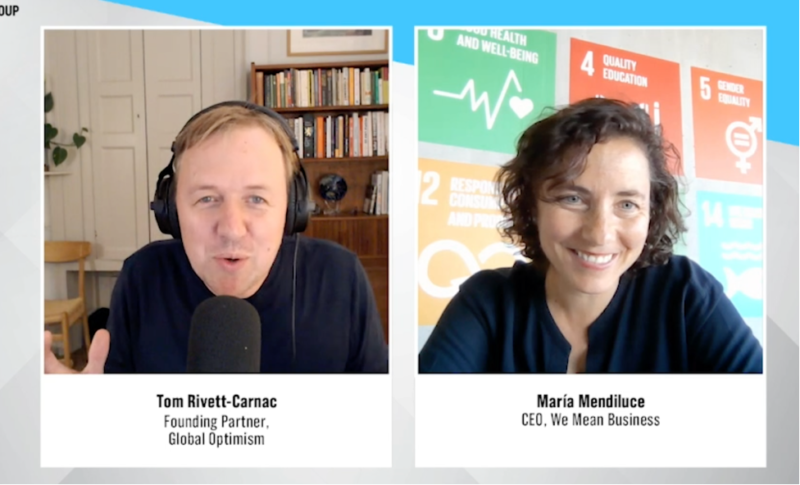A group of non-profits have published a new guide outlining how companies can scale up climate action, coinciding with a virtual launch session as part of Climate Week NYC.
Produced by the We Mean Business coalition, Climate Leadership Now lays out the group’s vision for what corporate climate action needs to look like over the next decade and calls on private sector leaders to pave the way.
The guide was developed by We Mean Business and its coalition partners — BSR, CDP, Ceres, The B Team, the Climate Group, The Prince of Wales’s Corporate Leaders Group and the World Business Council for Sustainable Development — and raises the bar for climate action in business.
At a Climate Week NYC session, María Mendiluce, CEO of We Mean Business, said that while “it is true that there has been a mobilisation of business action” it was “not enough.”
“As we know we are entering into the decisive decade and we need to halve emissions. This means 27 gigatons of CO2 that we need to remove – we need to step up climate leadership now,” she said.
The guide is framed through three principles which it says forms “the agenda business needs”: ambition, action, and advocacy.
Combining these fundamental ideas — committing to ambitious strategies, delivering on targets, and calling for change among peers — is what “business leadership on climate change looks like today,” according to the coalition.
“Everything mentioned in the We Mean Business coalition’s Climate Leadership Now guide – ambition, action and advocacy – is mutually reinforcing. We must showcase ambition and deliver a credible pathway to decarbonization together,” said Dimitri de Vreeze, co-CEO of Royal DSM, which has committed to reach net zero emissions by 2050, set interim targets through the Science Based Targets initiative and source 100% renewable energy through RE100.
“As just one company, our impact on reducing global emissions might be limited, but we can all make much bigger waves by encouraging others and leading by example. We can show how it’s possible for anyone to do well by doing good,” de Vreeze added.
The guide demonstrates the wealth of benefits which accompany businesses that lead on climate action, and this was a central theme of the Climate Week NYC session.
“Climate leadership is something that is obviously about benefits to society. It’s about benefits to the environment, but it also brings benefits to the companies that take it,” said Eliot Whittington, director of Corporate Leaders Group, one of the coalition’s partners.
“Climate leadership prompts innovation, it prompts new product development, it prompts efficiency in cost savings, it also helps motivate and mobilise your employee base and your customers, it tells a better story about a company,” Whittington added.
This sentiment was echoed by Claire O’Neill, recently appointed managing director for climate and energy at the World Business Council for Sustainable Development, who said “sustainable businesses are better businesses.”
The former Cop26 president-designate added that, “if you’re looking at what will actually stick over the long term, you go to where there’s strategy, investment, really clear governance, and transparency, and that is happening in, not all, but many of the boardrooms around the world.”
Climate Leadership Now congratulates the hundreds of companies that are now setting ambitious science-based emissions reduction targets aligning with the goals of the Paris Agreement, and calls for collaboration and partnerships to accelerate the transition to a zero-carbon economy.
The session heard from representatives of several international companies, including Magali Anderson, chief sustainability officer of cement company Lafarge Holcim, who said, “Buildings and infrastructure play a key role to win the race to net zero. This requires a collaboration across the entire value chain, from architects to policymakers.”
The guide also looks at how “environmental and social resilience are intimately intertwined,” highlighting how the Covid-19 pandemic has exposed global injustices and economic systems.
“We cannot solve the climate crisis without addressing the unsustainable levels of inequality around the world,” said Halla Tómasdóttir, CEO of The B Team, a global non-profit that calls for an end to business as usual.
“We need that diversity and inclusion; we need women, we need black people, we need people of different financial and socio-economic status involved in creating this world, because frankly we are not understanding the issues unless we do,” she added.
And despite Covid-19 this year, the coalition has not lost its momentum.
Since the virus emerged, We Mean Business has called on governments to “build back better” and include long-term government stimulus packages to address the economy and climate together, while only earlier this week the organisation co-launched SME Climate Hub, a “one-stop-shop climate action platform for small and medium-sized enterprises (SMEs).”
See the Climate Leadership Now press release here.
This post was sponsored by We Mean Business. See our editorial guidelines for what this means.
